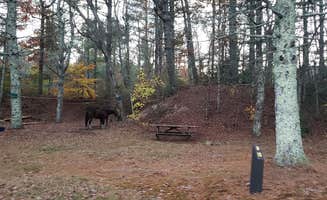LeGrand Reynolds Horsemen's Camping Area provides primitive equestrian camping within the 14,000-acre Arcadia Management Area in Rhode Island. Located 22 miles from Johnston, this campground sits at approximately 430 feet elevation in a mixed hardwood forest. The area experiences typical New England weather patterns with warm summers and cold winters, making late spring through early fall the ideal camping season.
What to do
Trail riding opportunities: The equestrian trail system at Frog Hollow Horse Camp at Pachaug State Forest offers multiple riding loops accessible directly from the campground. As one reviewer notes, "Three horseback riding loops leave from the campground. There's also fishing and hiking available in the forest."
Hiking access: The forest trails surrounding horse campgrounds near Johnston provide excellent hiking opportunities. At Ponkapoag Camp, "Hiking trails abound on the property. While none of the trails are steep, they all go through beautiful areas, with views of the pond, and interesting rock formations."
Water activities: Many equestrian campgrounds in the region offer water access for additional recreation. Ponkapoag Camp features "a wonderful place for kayaking and canoeing. There are several rocky boulders poking out of the water that make fun spots to discover. The sunsets over the pond are spectacular to watch from the dock."
Wildlife viewing: The forests around equestrian campgrounds provide habitat for diverse New England wildlife. As one visitor to Frog Hollow notes, "The campground doesn't feel that large as the loop probably had 50 sites. Our site was wooded and pretty private for a state campground."
What campers like
Peaceful atmosphere: Horse camping areas typically offer more seclusion than standard campgrounds. At Wolf Den Campground, one camper appreciated that there was "totally silent. No road noise. Most sites are relatively short level pads, with little or no shade, but very pleasant."
Equestrian facilities: Specialized horse campgrounds provide essential amenities for equestrians. While some locations like LeGrand Reynolds require riders to bring containment systems, others offer different arrangements. At Frog Hollow, "There's space for your camping gear as well as a trailer and horseline."
Forest access: The location of equestrian campgrounds typically provides immediate trail access. At Charge Pond Campground, "The bike trails through the park are great and we enjoyed them. Paved and mountain bike trails."
Community atmosphere: Horse campers often appreciate the camaraderie at equestrian campgrounds. A visitor to Ponkapoag Camp noted, "The people are friendly and we have always had a good time. The kids can hang out in the clubhouse if it's raining or swim in the pond if it's hot."
What you should know
Seasonal considerations: Most horse campgrounds near Johnston, Rhode Island have limited operating seasons. Wolf Den Campground is open "from May 26 to September 4," making it important to plan trips accordingly.
Reservation requirements: Many equestrian campgrounds require advance booking. At Normandy Farms Campground, "When you enter Normandy Farms it is more like checking into a hotel than campground complete with a concierge and express check-in."
Variable amenities: Facilities at horse campgrounds can range from primitive to developed. Ponkapoag Camp specifically notes "THERE IS NO ELECTRICITY OR RUNNING WATER" and recommends "We brought all our water from home, and it worked well."
Trail conditions: Weather impacts trail conditions throughout the season. One camper at Wolf Den noted they "Wished we had time to check out the hiking trails accessible from the campground," suggesting visitors should plan enough time to explore.
Tips for camping with families
Recreational options: When camping with children near equestrian areas, look for campgrounds with additional activities. At Ponkapoag Camp, "The kids can hang out in the clubhouse if it's raining or swim in the pond if it's hot. Lots of hiking trails."
Safety considerations: Horse campgrounds require extra vigilance with children. At The Preserve Club and Residences, visitors note it's "New England's most amenity rich properties," but parents should still supervise children around horses.
Educational opportunities: The historical significance of areas like Myles Standish provides learning experiences. As one camper mentions, "The park is a great staging area for day trips to Plymouth and all its history."
Weather preparation: New England weather can change rapidly, requiring proper planning. A Ponkapoag visitor recommends preparation for temperature swings: "We were there Memorial Day weekend, and needed the stove when it dipped to 40 degrees."
Tips from RVers
Site selection: RVers should research specific site dimensions for horse camping areas. At Wolf Den, "Nice sized lots. Large open areas for kids and adults to play during day and star gaze at night."
Hookup availability: While many horse campgrounds offer limited services, some provide RV amenities. Normandy Farms offers "premium full hook-up (50 amp) to basic with just water and electric and many others in between. Both back-in and pull thrus are available."
Leveling challenges: Some horse campgrounds have uneven terrain. One camper at Charge Pond noted that "Some sites are on slight inclines and have a lot of roots so it makes having more than one tent hard."
Access considerations: Road conditions can impact RV access to horse campgrounds. A Wolf Den visitor mentioned the campground was "Easy to find the camp and the plot, well marked," making navigation simpler for those with larger rigs.


